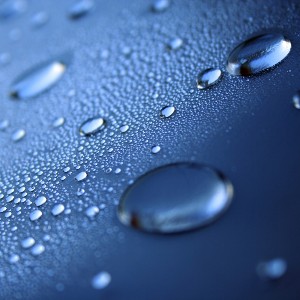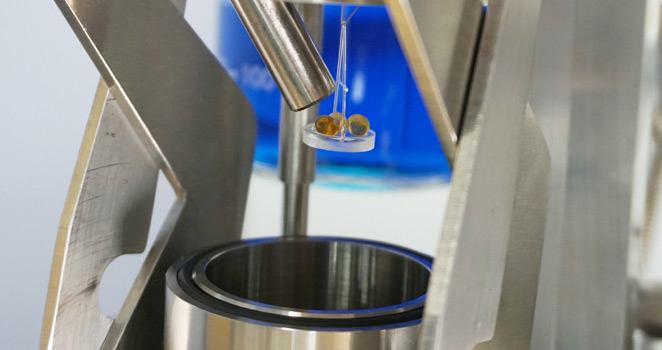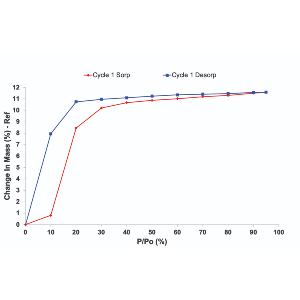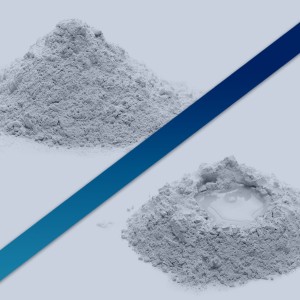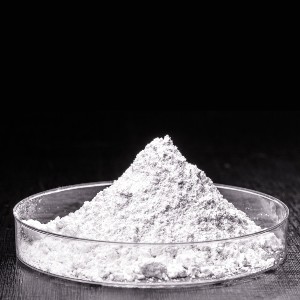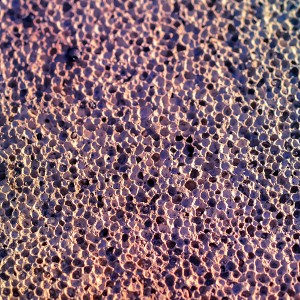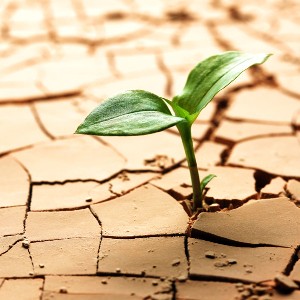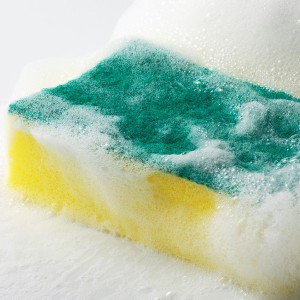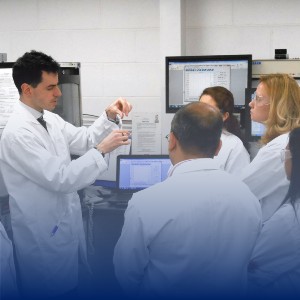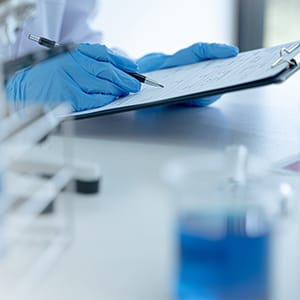Expand your understanding in sorption material analysis for carbon capture materials development as we provide innovative solutions for evaluating their effectiveness and applications in the field of carbon capture, supported by published data. Discover the power of complementary techniques including the DVS Carbon, DVS Vacuum and the BTA Frontier, designed to deliver unparalleled insights into kinetic data, competitive effects, and displacement phenomena under real world conditions. By bridging the gap between research and processing conditions, these cutting-edge techniques provide a comprehensive analysis of multicomponent systems, setting a new standard and a novel benchmark for precision and reliability in carbon capture research.
Don’t miss this exclusive opportunity to advance your expertise and revolutionize your approach to the comprehensive analysis of sorption materials used in carbon capture. Join us as we showcase how our advanced methodologies pave the way for more accurate and insightful evaluations, ultimately driving progress and innovation in the field.
The first SMS webinar of 2024 will feature a titan of the sorption research community delivering key insights into the use of specific polymers in membrane applications.
Prof. Peter M. Budd, Department of Chemistry at University of Manchester, will join us to explore his exciting findings into the potential for Polymers of Intrinsic Microporosity (PIMs) in advanced membrane applications. By enabling the production of materials with improved long-term performance and enhanced permeability, key issues facing gas separation, carbon capture and energy efficiency can be addressed.
With an opportunity to have your queries answered by Prof. Budd directly in a live Q&A, this is an unmissable opportunity to learn from one of the world’s leading polymer scientists.
Understanding the chemistry of gas-solid interactions is vital to determining how Volatile Organic Compounds are transported through geologic materials under different temperatures and humidity conditions. Inverse Gas Chromatography has proved an invaluable tool in understanding these interactions, especially when measured against usually heterogeneous geologic materials.
We are happy to be joined by leading expert Dr. Elizabeth H. Denis of Pacific Northwest National Laboratory to explore new research in the field of physicochemical characterization of geologic materials. In this session, Dr. Denis will describe how this technique was employed to analyze key physicochemical parameters used for modelling subsurface gas transport.
With an opportunity to engage our speaker directly in a live Q&A, this is a great opportunity to see iGC in action, and gain insight from a leading researcher actively employing the technique in the field.
Disclaimer
Reference herein to any specific commercial product, process, or service by trade name, trademark, manufacturer, or otherwise does not necessarily constitute or imply its endorsement, recommendation, or favoring by the United States Government or any agency thereof, or Battelle Memorial Institute. The views and options of authors expressed herein do not necessarily state or reflect those of the United States Government or any agency thereof.
In the fight against climate change, DAC has emerged as a promising solution to remove carbon dioxide directly from the atmosphere, offering a sustainable pathway to mitigate greenhouse gas emissions. This free-to-attend webinar brings together leading experts in the field who will explore the latest advancements in DAC technology, with a particular focus on the role of adsorption processes.
Researchers from Imperial College London will discuss recent findings and key technological considerations for advancing Direct Air Capture (DAC) through adsorption. This will be followed by a presentation from Dr. Paul Iacomi, Product Manager of DVS Carbon, who will provide detailed practical case studies showcasing DAC in action using advanced sorption instrumentation.
All speakers will be present for Live Q&A and open roundtable discussion after the main agenda. This session is free to attend, so seize the opportunity to enhance your knowledge of Carbon Capture and gain insights from leading researchers in this dynamic field.
Full agenda:
Key Technological Considerations for the Advancement of Adsorption-Based Direct Air Capture
Speakers: Hassan Azzan, Lucy Barton, Ashlyn Low, Prof. Camille Petit, Imperial College London
View abstract >>
Influence of humidity on CO2 solid sorbent performance: insights and challenges
Speaker: Dr. Paul Iacomi, Surface Measurement Systems
View Abstract >>
Round Table Discussion
Join this upcoming webinar to discover new insights and research into the vital property of Surface Area, and it’s measurement and analysis in the development of pharmaceutical materials, featuring a world-leading expert on Sorption Science, Dr. Daniel J. Burnett (Vice President, Surface Measurement Systems).
Surface area is a commonly measured property of pharmaceutical powders/particles/granules. Traditional surface area measurements are typically performed using volumetric Nitrogen or Krypton sorption isotherms. These measurements must be performed at cryogenic temperatures and under high vacuum. For many organic solids, biomaterials, and polymers, these conditions can artificially induce structural and phase changes.
Inverse Gas Chromatography (IGC) is another sorption technique that can routinely measure surface area for a wider range of materials. Unlike volumetric techniques, IGC surface area measurements do not require high vacuum and can be performed at ambient temperatures. In addition, IGC can measure surface areas at controlled relative humidity conditions. For these reasons, IGC can directly determine surface areas of pharmaceutical ingredients at relevant storage and processing conditions. Also, surface areas can be determined without exposing the sample to pressures and temperatures that may induced irreversible structural changes.
In this review presentation, several case studies focused on measuring the surface areas of pharmaceutical and organic materials will be introduced. Work will be highlighted by recent investigations from SMS, as well as a review of previously published work from other groups. Register free now!
With the release of the DVS Carbon, researchers now have a powerful, purpose-built tool for characterizing materials for Carbon Capture, Utilization, and Storage (CCUS) applications. With unique measurement and engineering capabilities, we are excited to demonstrate what this new instrument can do!
In this webinar, Product Manager Dr. Paul Iacomi will take the audience through the unique features of this innovative instrument, before having a closer look at the DVS Carbon’s capabilities in action. Case studies on the instrument’s applications, including Direct Air Capture and Post-combustion Capture, will show how to utilize the DVS Carbon in your own research.
The audience will also be given the opportunity to have their questions on the DVS Carbon and CCUS applications answered by the speaker in a live Q&A. Register free now.
Join our next webinar to explore recent advances & research into the use of advanced sorption techniques in analyzing key performance properties of biomaterials.
We are excited to be joined by Tiantian Yin, of McGill University, who will be exploring recent research into the use of Dynamic Vapour Sorption in characterizing vital properties affecting the mineralization of bioactive borate glasses, specifically when examined in conjunction with in-situ Raman.
This will be followed by Dan Burnett, Vice President of SMS, who will provide an overview of recent studies into measuring surface energy & wettability in biomaterials.
With an opportunity to engage the speakers directly in a live Q&A, this is an unmissable chance to gain fresh insights into recent advances in biomaterials characterization.
Full agenda:
Characterization of sodium & calcium addition on immediate aqueous interactions of binary borate glasses by DVS with in-situ Raman
Speaker: Tiantian Yin, McGill University
View abstract >>
The Importance of Surface Energy and Wettability in Biomaterials
Speaker: Dr. Dan Burnett, Surface Measurement Systems
View abstract >>
This workshop presents recent research from both ASG Analytik-Service AG (ASG) and Surface Measurement Systems.
When determining the uses and properties of oils, lubricants, seals, and VOCs, detailed knowledge of vapor pressure is vital for reasons of both function and safety. The speakers at this workshop explore their work in this area, detailing the techniques, instruments, and findings in their research into vapor pressure.
As well as featuring new research & case studies from leading global thought leaders in materials characterization, attendees also engaged with the speakers in a live Q&A. This was a unique opportunity to gain insight from global thought leaders, and engage with top scientists in your field.
We are excited to collaborate with Dr. Johanna Sygusch from the Helmholtz Institute Freiberg for Resource Technology on our next webinar, exploring recent characterization research into advanced battery materials.
Nowadays many electronic devices are being operated by batteries, including everyday devices (e.g. laptop and smartphones), healthcare devices (e.g. toothbrush), tools, toys, and vehicles as well. The use of batteries is forecast to increase significantly in the upcoming years. Therefore, the development of long and high-performance batteries and also the need to recycle spent batteries in order to ensure the supply of critical raw materials increased significantly in the last years, but is a complex task since the individual batteries have rather complex structures and varying composition.
During the development of the battery materials, temperature stability is one of the key parameters besides energy density, power density, lifetime, charging rate, cost and safety. Furthermore, the understanding of the surface properties and interfacial interactions of the anode and cathode materials is crucial in order to improve and develop efficient manufacturing and recycling processes.
In this webinar we present the surface and interfacial properties of different cathode (LCO, NMC, LFP) and anode (natural and synthetic graphite) materials. Characteristic properties include the specific surface area, the surface energetics at different temperatures measured with inverse Gas Chromatography (IGC) as well as water and cyclohexane sorption behaviour by Dynamic Vapour Sorption (DVS). Furthermore, we are going to present some results on wettability characterization using optical contour analysis and the Washburn method, as well as bubble-attachment and analytical particle solvent extraction tests. We also discuss which challenges arise during the recycling of spent lithium ion batteries by using the separation process of froth flotation.
Dr. Sygusch and Dr. Kondor will, among other things, give a detailed introduction to the Inverse Gas Chromatography and Dynamic Vapor Sorption techniques. With a live Q&A to finish the session, this is an unmissable opportunity to gain fresh insight into this vitally important topic from two leading experts.
This free online workshop, was organised with Fraunhofer IFAM, and we explore using advanced vapor sorption techniques and instrumentation to explore and evaluate the diffusion behaviours of solid state materials.
Discussing this topic are two leading experts in vapor sorption analysis, Dr. Michael Hoffmann (Fraunhofer IFAM) & Dr. Anett Kondor (Surface Measurement Systems). They explore the Dynamic Vapor Sorption and Inverse Gas Chromatography techniques, and how they are employed by labs across the world to provide detailed insight on diffusion.
